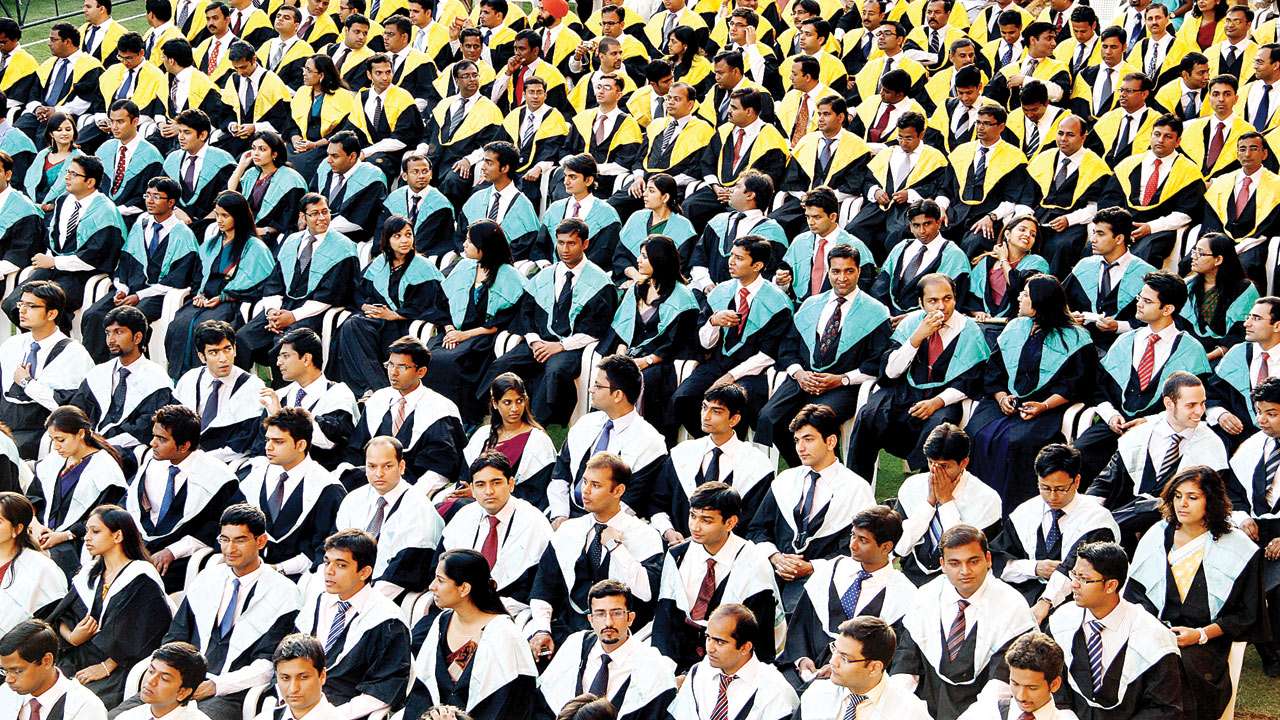
MBA programmes in most of the developed world are about shifting from an existing career path to a second trajectory of rapid personal career growth with the help of an added qualification. It also helps to join a new network of professional acquaintances.
In India, MBA is a terminal qualification for embarking upon a first career.
In the late 19th and early 20th Centuries, the purpose of an MBA centred on liberal and moral education for business managers to enhance their status in public and private life. At the forefront of this world wide success of an MBA degree have been four countries — France, Germany, UK and the US. They had a simple proposition for their MBA degree holders: Educate managers in the practical aspects of management.
Directed towards liberal and free business in an era of command and control economy, the Indian MBA began some 60 years ago and was quite successful due to the legitimacy accorded by government, affordability thanks to public funding and the best talent pool.
The supply of Indian MBAs remained limited and because their quality was high, the standards of the MBA programme itself was of no consequence. The early 1980s had only 50-odd programmes producing around 2,000 MBAs a year.
Entrepreneurs sniffed a business proposition in the delivery of MBA programmes post the 1992 jump start of the Indian economy, as there were openings to attract customers and make profits.
During the last 25 years, MBA schools have done well as a business, expanding at a furious pace, delivering degrees of uncertain expertise of “managing business”.
The Indian MBA has materialised as a higher grade in continuation of their Bachelor degrees for college leaving people who typically lack prior work experience.
Excluding a few, MBA programmes in India are regulated by the All India Council for Technical Education (AICTE). In nearly 30 years of its statutory existence, AICTE has proven itself to be a licensing authority setting up new technical institutions offering programmes at diploma/post-diploma/degree/post-graduate degree/post-graduate diploma levels in the disciplines of engineering and technology, architecture, town planning, management, pharmacy and applied arts and crafts.
In terms of regulatory domain for AICTE, most programmes in management are at the Masters or post-graduate levels, while for rest of the disciplines, the programmes are at Bachelors or under-graduate levels.
AICTE has, of late, created a buzz around ‘outcome-based learning objectives’, a concept more appropriate to upper-secondary-level vocational skills training and lower-tertiary-level technical education and much off the track for any post-graduate education.
MBA-institutes have been AICTE’s principle antagonists with “Management” discipline its biggest victim. Through strategic legal stalling, institutes have blunted every attempt by AICTE to regulate admission tests, session-dates, fee-structure, curriculum, work-loads and duration and nearly every other process in management programmes.
AICTE has nothing to showcase as its achievement against even one of its three mandated objectives: (1) promotion of quality, (2) planning and coordinated development of MBA systems and (3) regulation and maintenance of norms and standards. In practice, it is AICTE which has failed the Indian MBA.
Relish this — as per unofficial estimates, there are less than 20,000 MBA and related institutions worldwide, with nearly two million aspirants enrolled and some 800,000 of them receive an MBA or an equivalent degree each year.
Of these, India accounts for nearly 5,000 institutions trying to churn out some 350,000 MBAs each year. India is a $3 trillion economy.
Contrast it with the US, a $19 trillion economy that has a little over 500 accredited and non-accredited MBA colleges, awarding less than 100,000 MBA degrees each year, a lot of them to non-US students, and these are more than what that country needs.
India has a cottage industry operation of unviable, multiple factories, together over-producing ‘MBAs’ of no “fitness for use” for the industry or society.
Economist (international programme outcome ranking) ranks MBA programmes on four parameters: Opening new career opportunities (35 per cent), personal development and educational experience (35 per cent), better pay (20 per cent) and networking potential (10 per cent).
Other international rankings like those from Bloomberg, Business Week, Forbes, Financial Times and the Wall Street Journal have parallel focus.
NIRF (Indian Institutional Rankings) uses five parameters: Teaching, learning and resources, research and professional practice, graduation outcomes, outreach and inclusivity, and perception.
There are a plethora of other rankings, including those by Business Today, Business India, Business World, ET, Business Standard, AIMA, MBAUniverse, Outlook, Careers360 and so on, which have near analogous approaches, but produce very divergent results making the entire exercise of rankings doubtful and suspect.
Indian B-schools are so regulated and ranked that instead of chasing relevance, they remain focussed on their structures and systems, a fossilised hangover from the era of directed economies. Everything around an MBA degree yearns for a change, yet the MBA itself is not changing.
Studies have shown that only seven per cent of MBA graduates, excluding those from the top 20 Indian business schools, get a job straight after completing their course, and having spent Rs 300,000 to Rs 500,000 on a two-year MBA programme, they draw a monthly salary of a princely Rs 8,000 to Rs 10,000. Even six months after completion of their MBA, more than half of them remain “looking for any job”.
Wake up everyone please. Focus on outcomes of MBA in terms of its benefits to the individuals, the economy and the society. Consider numbers of job opportunities, requirements-for-jobs and wed them to learning. Slumber, lack of forethought and inertia of MHRD, AICTE and NBA is impairing the Indian MBA.
Author is former director, MDI Gurgaon